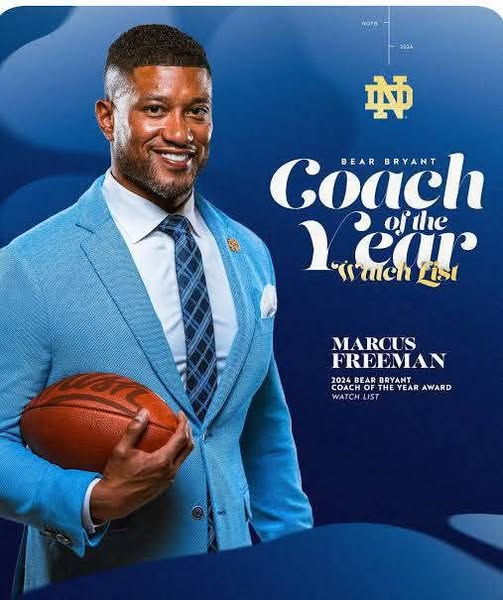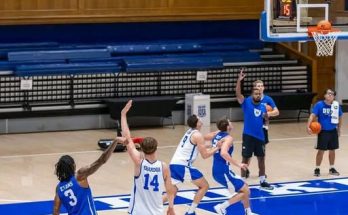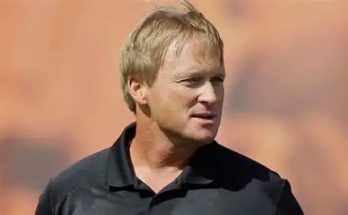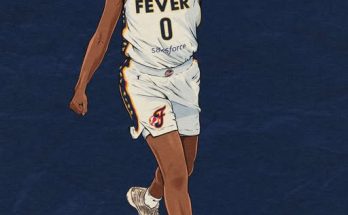In the world of college football, a select group of coaches rise to the occasion, transforming programs, leading teams to greatness, and leaving indelible marks on the sport. Among those coaches, Marcus Freeman stands out as a trailblazer in a momentous year. In 2025, Freeman achieved something that had never been done before at the University of Notre Dame: he became the first coach in the program’s storied history to win both the Dodd Trophy and the Coach of the Year Award in the same season. This historic achievement not only solidifies Freeman’s place in Notre Dame’s coaching lineage but also exemplifies his remarkable leadership, innovation, and commitment to excellence on and off the field.
Freeman’s ascent to this pinnacle of success is even more remarkable given his relatively short tenure at Notre Dame. When he was hired as the head coach in 2022, Freeman faced the immense challenge of stepping into the shoes of one of college football’s most iconic figures, Brian Kelly, who had helmed the Fighting Irish for over a decade. The expectations were high. Notre Dame’s legacy of football excellence, its rich traditions, and its national reputation all placed a significant weight on Freeman’s shoulders. He wasn’t just tasked with winning games; Freeman had to restore the program to national prominence and maintain its place among college football’s elite.
In his first season as head coach in 2022, Freeman encountered a few setbacks. The Fighting Irish finished with a solid 9-4 record, but it was clear that the team was still in the midst of a transition. Nevertheless, Freeman showed promise, and the program’s potential under his leadership was evident. The next season, however, marked the beginning of something special. Freeman’s Notre Dame team played with a new sense of purpose, one that reflected his character as a coach and as a person. He inspired his players not just to perform on the field but to embody the core values of Notre Dame—faith, service, and excellence.
By the time the 2024 season came around, Freeman had fully ingrained his philosophy into the Fighting Irish football program. He was no longer just the new coach; he was the man who was building a dynasty. Notre Dame entered the season with high expectations, and Freeman’s team was primed for greatness. They played with unmatched intensity, showing off both their offensive prowess and defensive dominance. The team’s cohesion and drive were palpable, and it was evident that Freeman had become the heartbeat of the program.
The Dodd Trophy, often referred to as the “Coaching Heisman,” is one of the most prestigious awards a college football coach can receive. It is presented annually to the coach who has demonstrated excellence on and off the field, with particular emphasis on leadership, integrity, and commitment to player development. The criteria for the Dodd Trophy are rigorous, and the selection committee is tasked with evaluating coaches not only for their wins and losses but also for the impact they have on their players and the community. Winning this award is a testament to a coach’s ability to inspire and lead a team to success while also maintaining high ethical standards.
Freeman’s selection as the recipient of the 2025 Dodd Trophy was a testament to his exceptional leadership and coaching abilities. Under his guidance, the Fighting Irish had a phenomenal season, finishing with a national championship berth and several signature wins over top-ranked teams. Notre Dame’s offensive and defensive units were well-balanced, a reflection of Freeman’s ability to both recruit top-tier talent and develop his players effectively. What set Freeman apart, however, was his ability to create a culture of unity and excellence. His players not only thrived on the field but also carried themselves with integrity and humility off the field. Freeman had successfully cultivated a program where success was measured by both victories and the overall development of young men.
Freeman’s coaching philosophy centers around trust, respect, and accountability. He understands the pressures of being a college football coach, particularly at a program like Notre Dame, where the spotlight is always shining brightly. Yet, rather than shrinking under the weight of expectations, Freeman embraced them and used them as fuel to motivate his team. He built a coaching staff that was equally committed to the development of players, and together they created a system that allowed the team to play with passion and purpose. Freeman’s ability to get the best out of his players, even in the most pressure-filled moments, was one of the key reasons behind his success.
The Coach of the Year Award, like the Dodd Trophy, is another prestigious honor that recognizes excellence in coaching. Winning both awards in the same season is a rare and historic accomplishment, underscoring Freeman’s extraordinary achievements. The Coach of the Year Award is given to the coach who has had the most outstanding impact on his team, not just through wins but through his overall leadership, strategy, and ability to inspire. In 2025, Freeman’s Fighting Irish were undeniably one of the most well-coached teams in the nation, and his impact on the program was undeniable. He was not just a leader; he was a mentor, a motivator, and a symbol of Notre Dame’s commitment to excellence.
Freeman’s journey to becoming the first Notre Dame coach to win both the Dodd Trophy and Coach of the Year Award in the same season is one of perseverance, vision, and dedication. His success is a reflection of his unwavering belief in his players and his commitment to building a program that transcends football. Freeman’s ability to turn challenges into opportunities, to motivate his players, and to stay true to his values, set him apart as one of the premier coaches in college football.
For the players who have had the privilege of playing under Freeman, this achievement serves as both a source of pride and a reminder of the transformative power of leadership. Freeman has not only developed players who can win on the field but also young men who are prepared for success beyond college football. His emphasis on character development, discipline, and faith has helped shape a team that is both talented and well-rounded. Under his leadership, players have grown not only as athletes but as individuals who are committed to making a positive impact on the world around them.
Notre Dame football has a rich history, filled with legendary coaches and iconic moments. From Knute Rockne to Ara Parseghian to Lou Holtz, the program has been home to some of the greatest minds in college football. Freeman’s achievement adds a new chapter to this storied history, one that is defined by his unique coaching style and his ability to bring out the best in those around him. His victory in both the Dodd Trophy and the Coach of the Year Award serves as a reminder that greatness is not just about winning games, but about creating a legacy of leadership, integrity, and excellence.
In the years to come, Freeman’s name will be forever etched in the annals of Notre Dame football history. His unprecedented achievement in 2025 is a reflection of his extraordinary coaching abilities, his unwavering commitment to his players, and his dedication to building a program that will continue to succeed for generations to come. Marcus Freeman is more than just a football coach; he is a visionary leader who has forever changed the trajectory of Notre Dame football, and in doing so, he has solidified his place as one of the brightest minds in college football history.
As Freeman continues to lead the Fighting Irish to success, one thing is clear: his best years are still ahead of him. The 2025 season may have marked the pinnacle of his coaching career to date, but with his remarkable ability to inspire and his relentless pursuit of excellence, there is no telling just how far Freeman can take the Notre Dame program. What is certain, however, is that his legacy is already secure, and his achievement in winning both the Dodd Trophy and Coach of the Year in the same season will be remembered as one of the defining moments in the history of college football.



